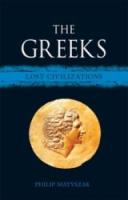
Reaktion Books (2018) h/b 208pp £15 (ISBN 9781780239002)
This book is the seventh in a series about ‘Lost Civilisations’ aimed at the general reader, which include the Etruscans, the Goths and the Indus cities. M. currently teaches at the Institute for Continuing Studies at Madingley Hall. His academic background is solid, with a PhD from Oxford, and he has the added benefit of his experience as a soldier and a journalist. Since 2003 he has become a prolific author on a range of subjects relating to ancient world.
In this book M. deliberately ignores the well-trodden 5th C BC on mainland Greece and concentrates on the Greeks of the diaspora. This spans a period of nearly 1900 years between 700 BC and AD 1200 and a geographic spread from Spain to Bactria. To cover this at all in less than 200 pages is a tour de force and to cover it with such a breadth of knowledge and with such clarity is a triumph. The sixty-eight, mainly coloured, illustrations are attractive and relevant, and the timeline at the start of the book is an essential tool; more, and more informative, maps would perhaps have been beneficial. The house style foregoes notes and a bibliography.
M. explains that it is not easy to define ‘Greek’ in this context. It is clearly not confined to someone living or even born in mainland Greece. It is not necessarily even confined to someone who was ethnically Greek. Using Greek as one’s first language appears to be an important criterion; also perhaps a natural affiliation to the cultural norms of mainland classical Greece. On this basis M. shows how the mainland Greeks early on moved west into Magna Graecia and east into Asia Minor and expanded the cultural effect by so doing; how Alexander vastly expanded its reach by his eastward invasions; how his successors managed to maintain and develop the cultural impact within the Seleucid and Ptolemaic satrapies; how the spirit of the culture resisted and even overcame the assault of the Romans; and how it clung on, only partly dimmed, throughout the long decline of the Byzantine empire.
There is perhaps too much text given over to the description of the never-ending internecine wars and assassinations of the power brokers. When M. does expand rather more on the cultural features of the story, such as the organisation of the great libraries in Pergamon and Alexandria, or the inventions of Herôn, one gets a sense of what a different balance of subject matter might have delivered.
Nevertheless The Greeks is a masterful and eminently readable account of an unfamiliar theme and is excellent value for money at £15.
Roger Barnes
